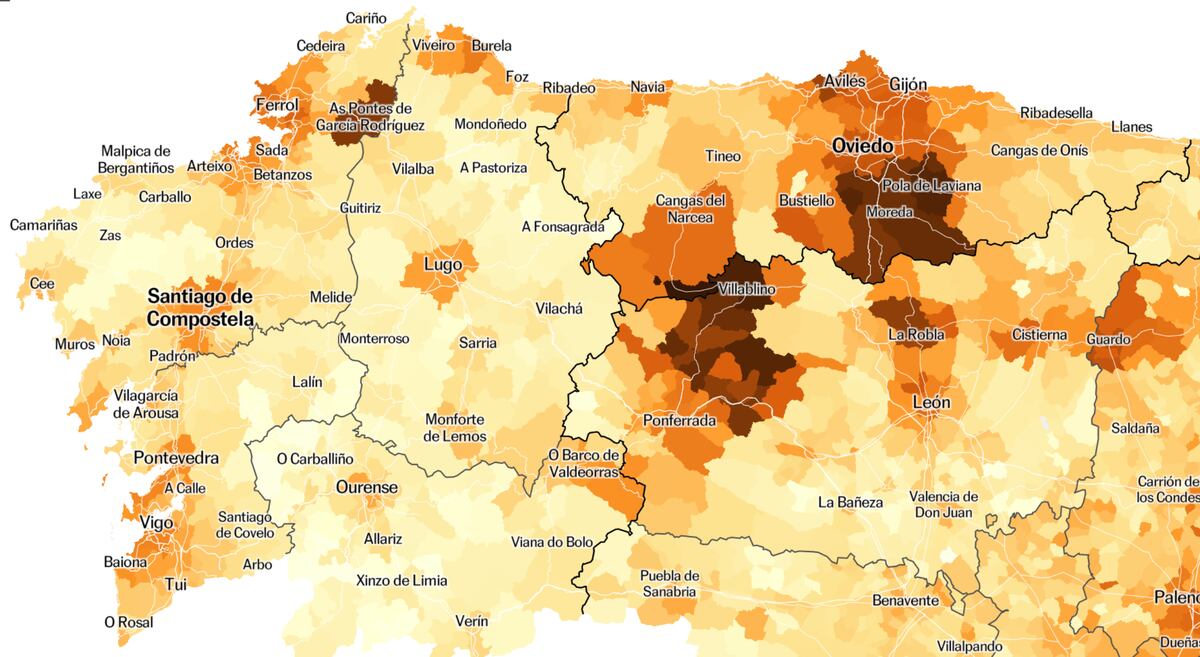Large cities multiply the capacities of individuals and the benefits of the companies that settle in them.
In urban agglomerations, people with special abilities have an easier time finding others that complement them and this increases productivity and the possibilities of learning.
However, not everyone has access to the social environments that offer these advantages and it is the same elite that generates the innovations and the wealth that concentrates the benefits, “with the majority of the inhabitants of the cities partially excluded from the benefits socioeconomic conditions of growing cities”.
This is the conclusion reached by a team of researchers from the University of Linköping (Sweden) who has just published their results in the journal
Nature Human Behavior
.
The planet is urbanizing faster and faster.
More than half of the inhabitants of the Earth live in cities and it is estimated that in the next decade the population of cities with more than 10 million inhabitants will multiply by four.
In principle, this urbanization process, which generally means an increase in wealth or inventions, will translate into an improvement in the resources available to the majority, but the distribution is far from equitable.
Taking data from Sweden, the US and Russia, the Linköping researchers analyzed various factors, from salary to the number of registered patents or the number of friends on social networks of individuals from these countries.
Looking at those various factors, they found striking inequality within cities.
On average, the people representing the top 10% of cities accounted for 50% of the total, a 44% higher share in cities with more than one million inhabitants than in those with less than 100,000.
To assess the contribution of urban elites to inequality between cities, they conducted tests excluding the top 10% of each city from the analysis.
Once elites were excluded, they found that the difference in productivity, interconnectivity, and innovation by city size narrowed,
depending on the factor observed, between 36% and 80%.
In other words, elites not only explain high inequality in large cities, but also explain much of the total inequalities between small and large cities.
"The extremely intelligent and extremely productive generate most of these effects of urban agglomerations and are responsible for Madrid or Barcelona having such a high urban GDP," says Marc Keuschnigg, professor at the Institute of Analytical Sociology at Linköping University. and lead author of the study.
“But at the same time, they are the ones who reap the benefits of the big cities,” he adds.
This effect that is seen between individuals is also reflected in the competition between cities.
Although the average large city dweller and the average small city dweller have almost identical salary histories, people who are successful early on in big cities are increasingly distanced from the average individual in their city, but also from those who have more successful in small towns.
This means that, in addition to differences between people, differences arise between cities, because many of the most talented people are attracted to the opportunities offered by large cities.
“This is a trend that, as we see in our model, reinforces itself over time and creates a process in which the rich get richer,” Keuschnigg says.
On the possibility of reducing this growing inequality with regulation, the professor warns that there is a risk that, "given the high mobility of urban elites and that the success of large cities depends to a great extent on the results of a small group, there are policies that harm the beneficial effects of urban concentrations” by trying to reduce inequality.
Diego Puga, a professor at the Center for Monetary and Financial Studies (CEMFI) in Madrid, has carried out studies in search of the reasons why both individuals and companies are more productive in large cities.
In a 2017 study, he tried to find out if people who succeed in cities would do just as well anywhere, or if being in a big city partly explained his success.
“On the one hand, we saw that if a person who has just graduated from his degree goes to Madrid, he starts out earning around 9% more than if he stays, for example, in Santiago de Compostela.
But that difference increases over time and reaches 36% in 10 years”, explains Puga.
"In addition, if after a while in Madrid he returns to Santiago, he only loses the initial difference,
everything you have accumulated afterwards in terms of more valuable experience you take with you and will continue to be valued in the future.
It is not that the best engineers are the ones who go to work in Madrid, but because they have worked there, they become better and then they are paid more, wherever they go”, he continues.
For Puga, despite the inequalities that arise in large cities, the positive effects of concentration on productivity and learning are unquestionable.
“Although the benefits are greater for some than for others, there tend to be benefits for all and, in addition, there are added consequences.
If you make public policies that reduce concentration in Madrid or Barcelona, this has effects on the aggregate productivity of the country, ”she warns.
Jorge De la Roca, a professor at the Sol Price School of Public Policy at the University of Southern California, points out that in the US "articles have already appeared that maintain that life in large cities is benefiting people who have higher education and less to those who do not have it, but the question is open”.
“In general, there is still a consensus that life in big cities benefits all its inhabitants to varying degrees,” he says.
In his opinion, it would not be desirable to spend resources trying to get people to live in a place where they will get less out of their talent.
“I think we would lose more by trying to keep very talented people living in a city where the economy as a whole doesn't benefit as much,” says De la Roca.
“But also, at least in a country like Spain, where there is a welfare state and fairly good infrastructure in almost all cities, people can consider returning after a while in the big city, because they may miss to people or because he prefers to be in a smaller city”, he affirms.
In fact, from De la Roca's point of view, it would be important to apply policies to make it easier for people who can contribute the most to move to big cities.
“Making access to housing a non-issue would be beneficial,” he says.
The housing problem in large cities, as a recent study by the Santa Fe Institute in the US showed, is much worse for people who earn less.
Although wealth increases when cities grow, the cost of living also rises,
particularly the accommodation.
The researchers' analysis showed that house prices grow faster than wages.
Keuschnigg believes that his results question the vision of cities as a universal tool to solve social problems of work or access to public services such as hospitals.
“When the cost of living in larger cities is taken into account, many of their inhabitants may be worse off than similar people living in smaller places, and instead of sharing the benefits of those large cities they may end up living a second-rate life”, he reflects.
“Our results”, the authors conclude, “raise doubts about the sustainability of urbanization against the background of growing inequality in cities”.
You can follow
EL PAÍS Salud y Bienestar
on
,
and
.





/cloudfront-eu-central-1.images.arcpublishing.com/prisa/RHYRDMQQ7BG5JOUSKAXBLKE6YE.jpg)



/cloudfront-eu-central-1.images.arcpublishing.com/prisa/LHD7AFJIJRDATGI2BJ6XL263EY.jpg)